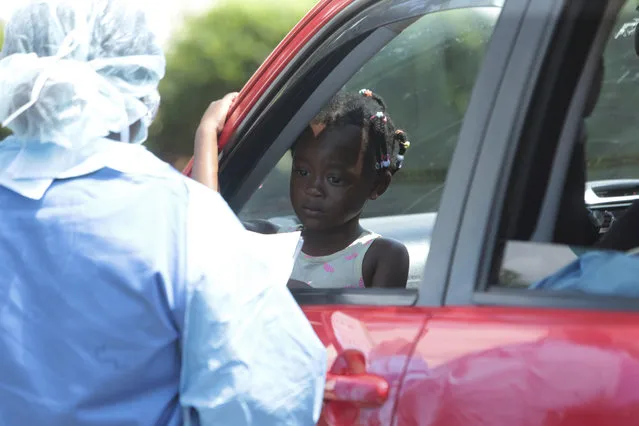
A child who has a high temperature has her details recorded by a health worker at a public hospital, in Harare, Zimbabwe, Saturday, March 21, 2020. Zimbabwean President Emmerson Mnangagwa announced a national disaster even before his country confirmed its first virus case on Friday. On Saturday, his country announced the first case in the capital, Harare. (Photo by Tsvangirayi Mukwazhi/AP Photo)
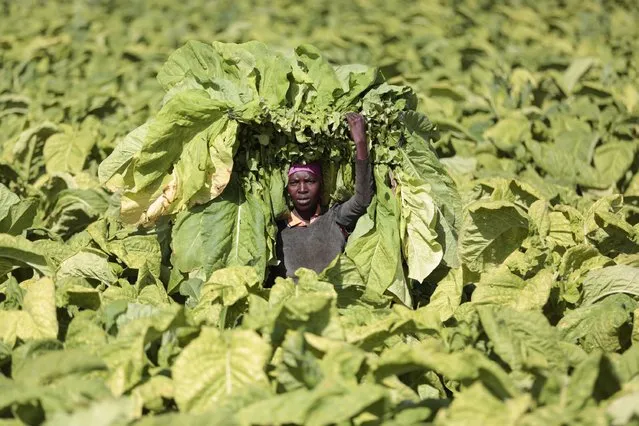
A worker carries fresh tobacco crop at Tilisa Farm in Bromley, 80 km from capital Harare, Zimbabwe, 29 January 2020. Zimbabwe's 2019 tobacco output was over 252 million kilograms and fears are that the 2020 crop might be affected by the current drought. (Photo by Aaron Ufumeli/EPA/EFE)
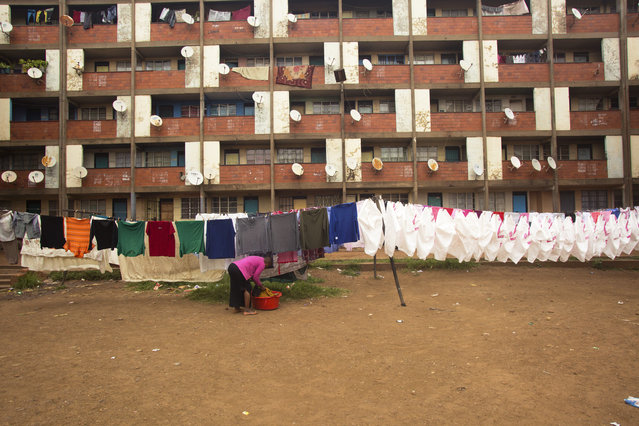
A woman prepares to hang her laundry at a block of flats in Harare, Zimbabwe, Wednesday, March 4, 2020. (Photo by Tsvangirayi Mukwazhi/AP Photo)
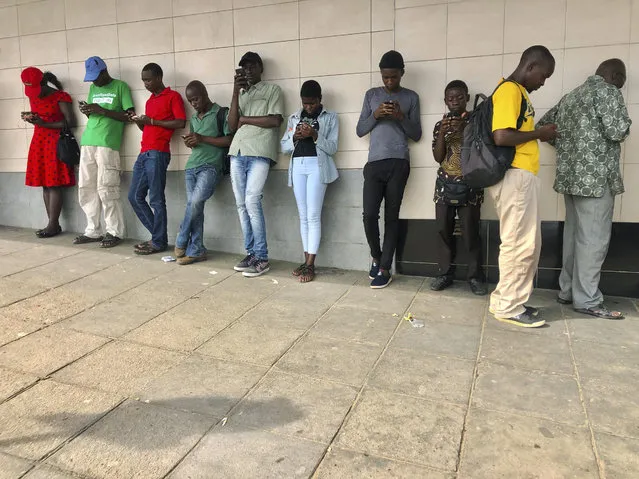
People acesss free wifi on their mobile phones at a public spot in Mutare, Saturday, November 23, 2019, about 270 kilometres east of the capital, Harare, Zimbabwe. According to a latest independent report, Zimbabwe has one of the worlds most expensive mobile data. The high cost of data has been mainly attributed to the fact that the country has relatively fewer mobile internet providers and that it is landlocked. (Photo by Tsvangirayi Mukwazhi/AP Photo)
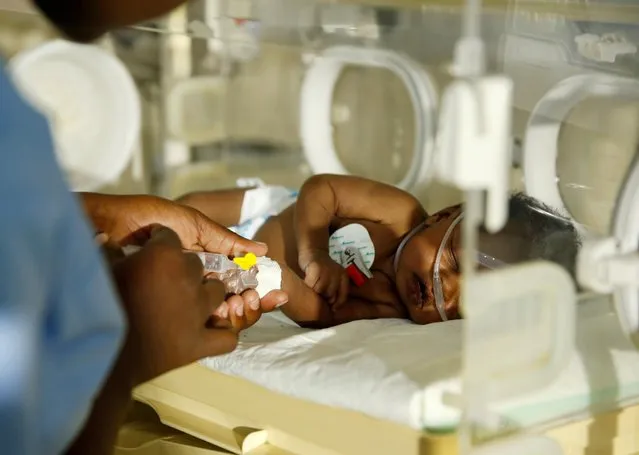
A nurse attends to a baby inside an incubator at a local government hospital in Harare, Zimbabwe, February 4, 2020. (Photo by Philimon Bulawayo/Reuters)
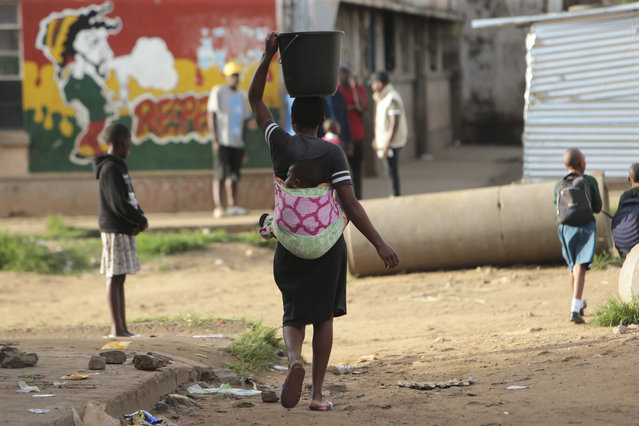
In this Monday, April 6, 2020 photo, a woman carries a her baby and a bucket of water in Harare. Lockdowns imposed to curb the coronavirus’ spread have put millions of women in Africa, Asia and elsewhere out of reach of birth control and other sexual and reproductive health needs. Confined to their homes with husbands and others, they face unwanted pregnancies and little idea of when they can reach the outside world again. (Photo by Tsvangirayi Mukwazhi/AP Photo)
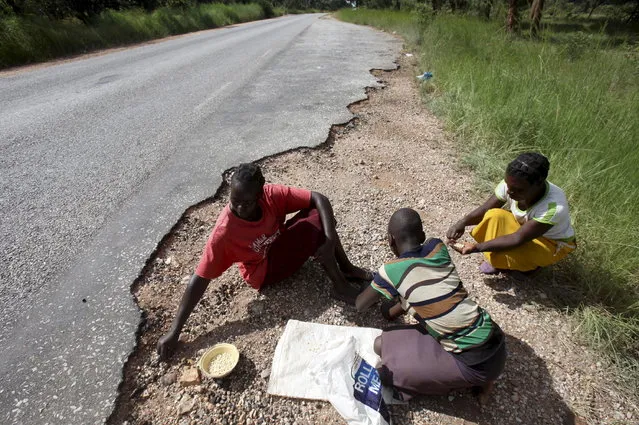
Women gather grain spilled by cargo trucks from Zambia along a highway in Magunje, Zimbabwe, February 20, 2016. (Photo by Philimon Bulawayo/Reuters)
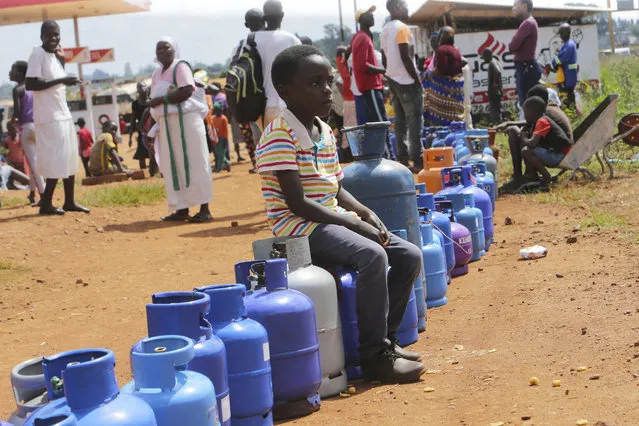
A young boy sits in a queue for cooking gas in Harare, Zimbabwe, Sunday, March, 29, 2020. Zimbabwean President Emmerson Mnangagwa announced a nationwide lockdown for 21 days, starting March 30, in an effort to stop the spread of the COVID-19 pandemic. (Photo by Tsvangirayi Mukwazhi/AP Photo)
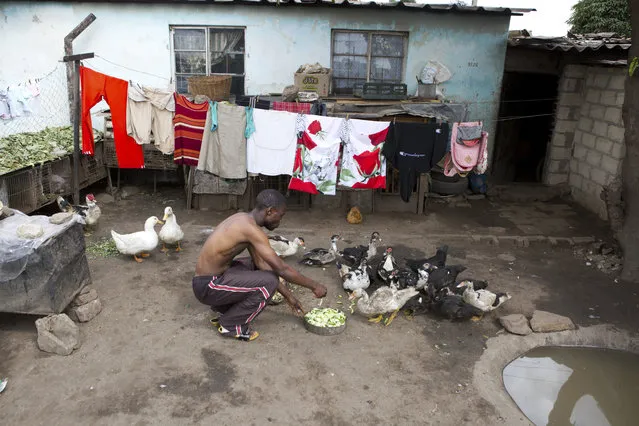
A man feeds his ducks outside his house in Harare, Zimbabwe, Monday, March, 30, 2020. Zimbabwe went into a lockdown for 21 days in an effort to curb the spread of the coronoavirus. (Photo by Tsvangirayi Mukwazhi/AP Photo)
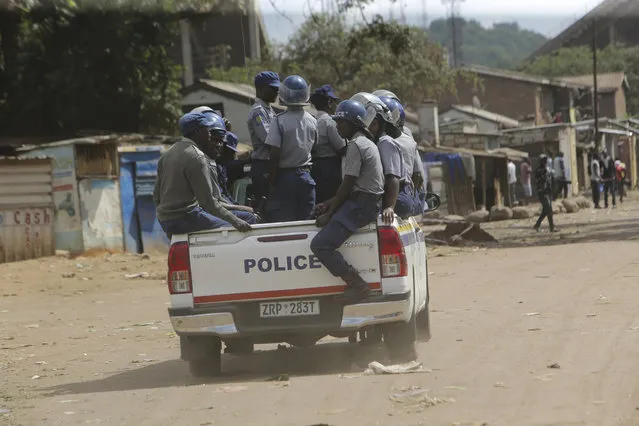
Zimbabwean police patrol the streets of Harare, Zimbabwe, Monday, March, 30, 2020. (Photo by Tsvangirayi Mukwazhi/AP Photo)
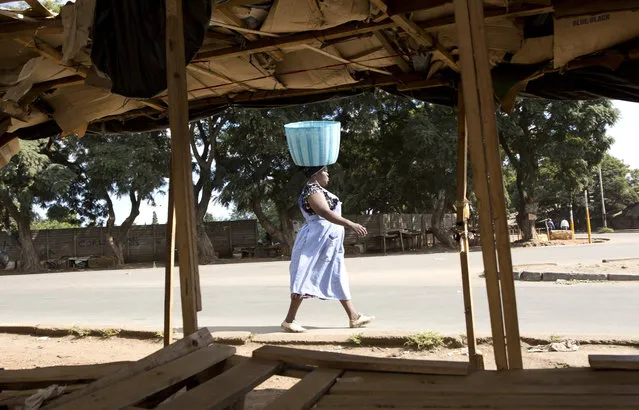
A woman carries an empty basket in a deserted market in Harare, Zimbabwe, Monday, March, 30, 2020. (Photo by Tsvangirayi Mukwazhi/AP Photo)
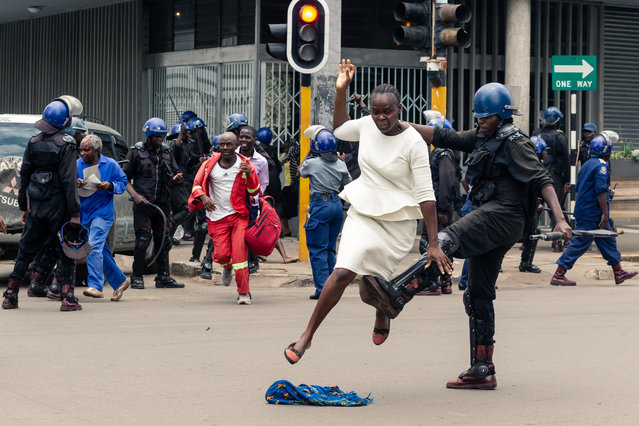
An anti-riot police man in Zimbabwe tackles a woman with his boot as they dispersed a crowd gathered to hear an address by leader of the MDC (Movement for Democratic Change) Alliance, Nelson Chamisa at Morgan Tsvangirai House, the party headquarters, in Harare, on November 20, 2019. Nelson Chamisa was due to address party supporters in his Hope of the Nation Address (HONA). The public address was blocked by riot police who beat up several people as they dispersed MDC supporters and other curious onlookers. (Photo by Jekesai Njikizana/AFP Photo)
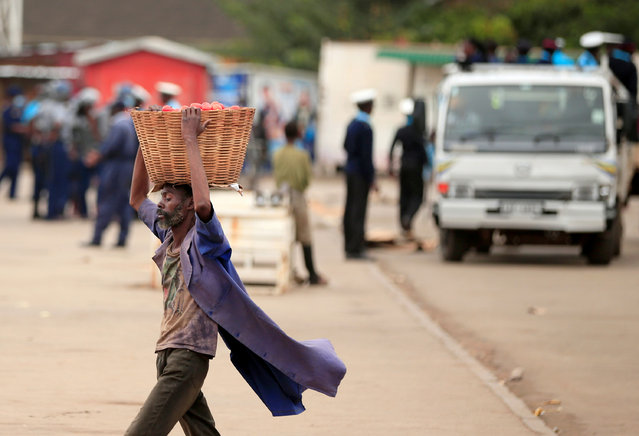
A man carries tomatoes as he runs from police as they destroy street vendor stalls during a nationwide lockdown called to help curb the spread of coronavirus disease (COVID-19) in Harare, Zimbabwe, April 19, 2020. (Photo by Philimon Bulawayo/Reuters)
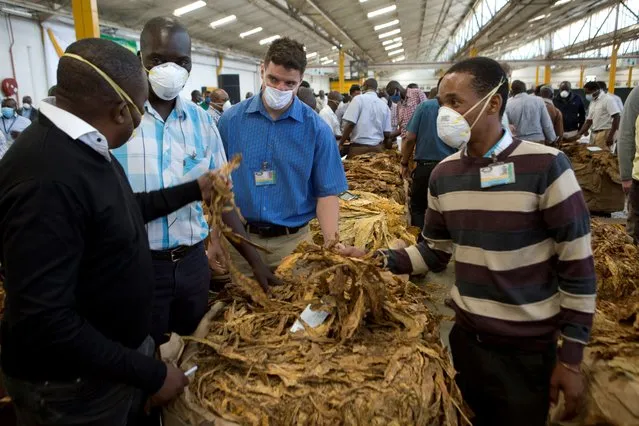
Tobacco auctioneers wear face masks to protect against coronavirus while inspecting crop on the first day of the tobacco marketing season in Harare, Zimbabwe, Wednesday, April 29, 2020. The tobacco selling season began across the country with auction floors complying with strict Covid-19 measures which included setting up clinics and isolation sites. (Photo by Tsvangirayi Mukwazhi)/AP Photo
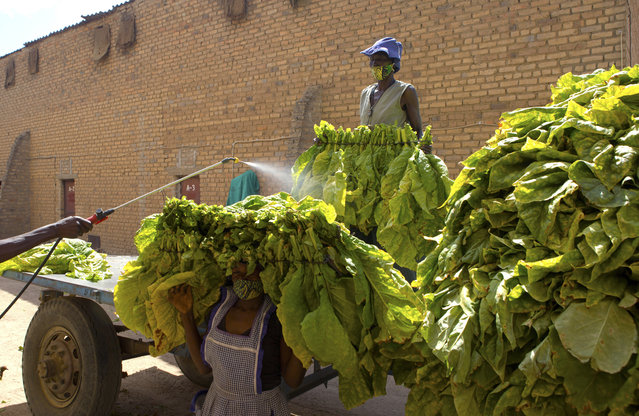
In this photo taken Thursday, April 30, 2020, a worker sprays chemicals on a tobacco crop before they are stored in a tobacco barn at a farm outside Zimbabwe's capital, Harare. Troubled Zimbabwe has officially opened the tobacco selling season after a month-long delay amid a coronavirus lockdown. Tobacco is the country's second biggest foreign currency earner after gold, and it brought in about $750 million last year. (Photo by Tsvangirayi Mukwazhi/AP Photo)

In this Thursday, January 15, 2009 file photo, village women receive aid from the charity organisation, Oxfam International, at a distribution centre in Chirumhanzi about 250 Kilometers South east of Harare. The United Nations says about half of Zimbabwe’s population faces severe hunger amid a devastating drought and economic collapse. The World Food Program notes a “vicious cycle of skyrocketing malnutrition that’s hitting women and children hardest”. More than 7 million people overall are in need. (Photo by Tsvangirayi Mukwazhi/AP Photo/File)
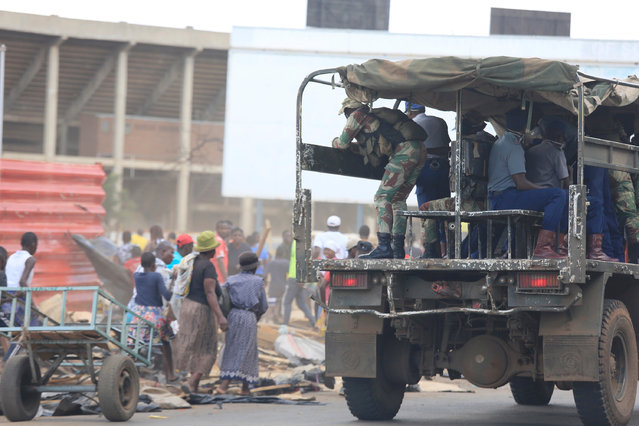
An army truck drives past demolished vending stalls in the township of Mbare, Zimbabwe, 18 April 2020. Zimbabwe celebrates its' 40th independence day. Zimbabwe gained its' freedom from British colonization on 18 April 1980 when the Union Jack was lowered and the Zimbabwe flag was raised coincidentally in this same suburb. (Photo by Aaron Ufumeli/EPA/EFE)
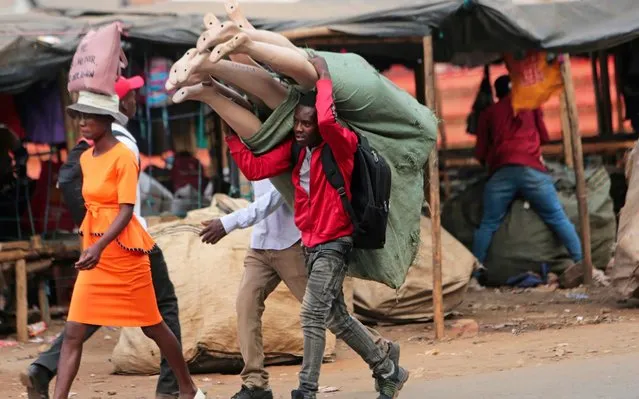
A man carries a bag with mannequins in Harare, Zimbabwe, in this photo taken Monday, March 2, 2020. (Photo by Tsvangirayi Mukwazhi/AP Photo)
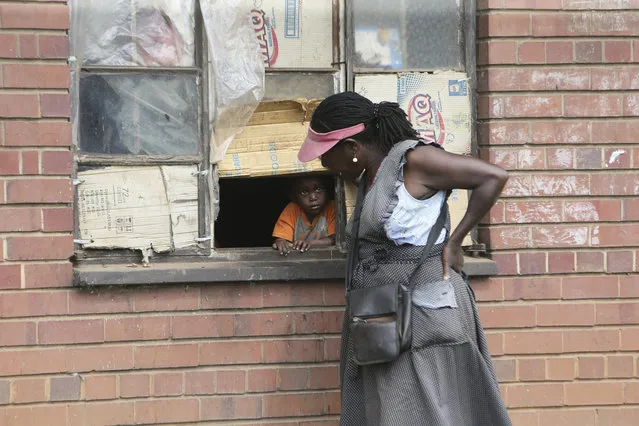
A woman talks to a child through a window in Harare, Thursday May 28, 2020. Manhunts have begun after hundreds of people, some with the coronavirus, fled quarantine centres in Zimbabwe and Malawi while authorities worry they will spread COVID-19 in countries whose health systems can be rapidly overwhelmed. (Photo by Tsvangirayi Mukwazhi/AP Photo)
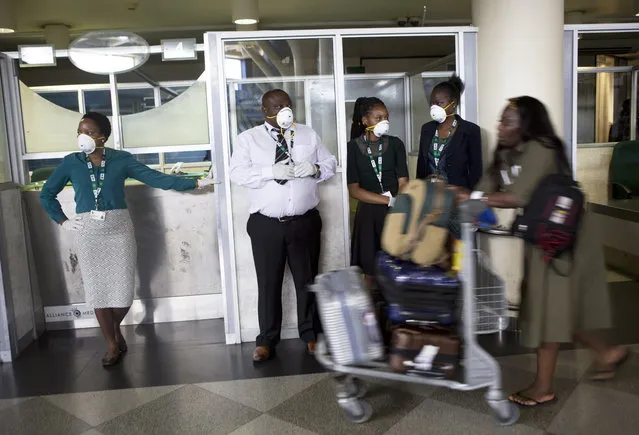
Travellers and airport staff, some wearing masks as a precaution against the coronavirus outbreak, walk through Robert Mugabe International airport in Harare, Wednesday, March, 11, 2020. For most people, the new coronavirus causes only mild or moderate symptoms, such as fever and cough. For some, especially older adults and people with existing health problems, it can cause more severe illness, including pneumonia. (Photo by Tsvangirayi Mukwazhi/AP Photo)
30 May 2020 00:01:00,
post received
0 comments
